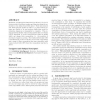Free Online Productivity Tools
i2Speak
i2Symbol
i2OCR
iTex2Img
iWeb2Print
iWeb2Shot
i2Type
iPdf2Split
iPdf2Merge
i2Bopomofo
i2Arabic
i2Style
i2Image
i2PDF
iLatex2Rtf
Sci2ools
GECCO
2009
Springer
2009
Springer
Evolution of team composition in multi-agent systems
Evolution of multi-agent teams has been shown to be an effective method of solving complex problems involving the exploration of an unknown problem space. These autonomous and heterogeneous agents are able to go places where humans are unable to go and perform tasks that would be otherwise dangerous or impossible to complete. This research tests the ability of the Orthogonal Evolution of Teams (OET) algorithm to evolve heterogeneous teams of agents which can change their composition, i.e. the numbers of each type of agent on a team. The results showed that OET could effectively produce both the correct team composition and a team for that composition that was competitive with teams evolved with OET where the composition was fixed a priori. Categories and Subject Descriptors I.2.9 [Artificial Intelligence]: Robotics - Autonomous vehicles; I.2.2 [Artificial Intelligence]: Automatic Programming General Terms Algorithms, Design Keywords autonomous vehicles, cooperation, teams
| Added | 26 May 2010 |
| Updated | 26 May 2010 |
| Type | Conference |
| Year | 2009 |
| Where | GECCO |
| Authors | Joshua Rubini, Robert B. Heckendorn, Terence Soule |
Comments (0)

